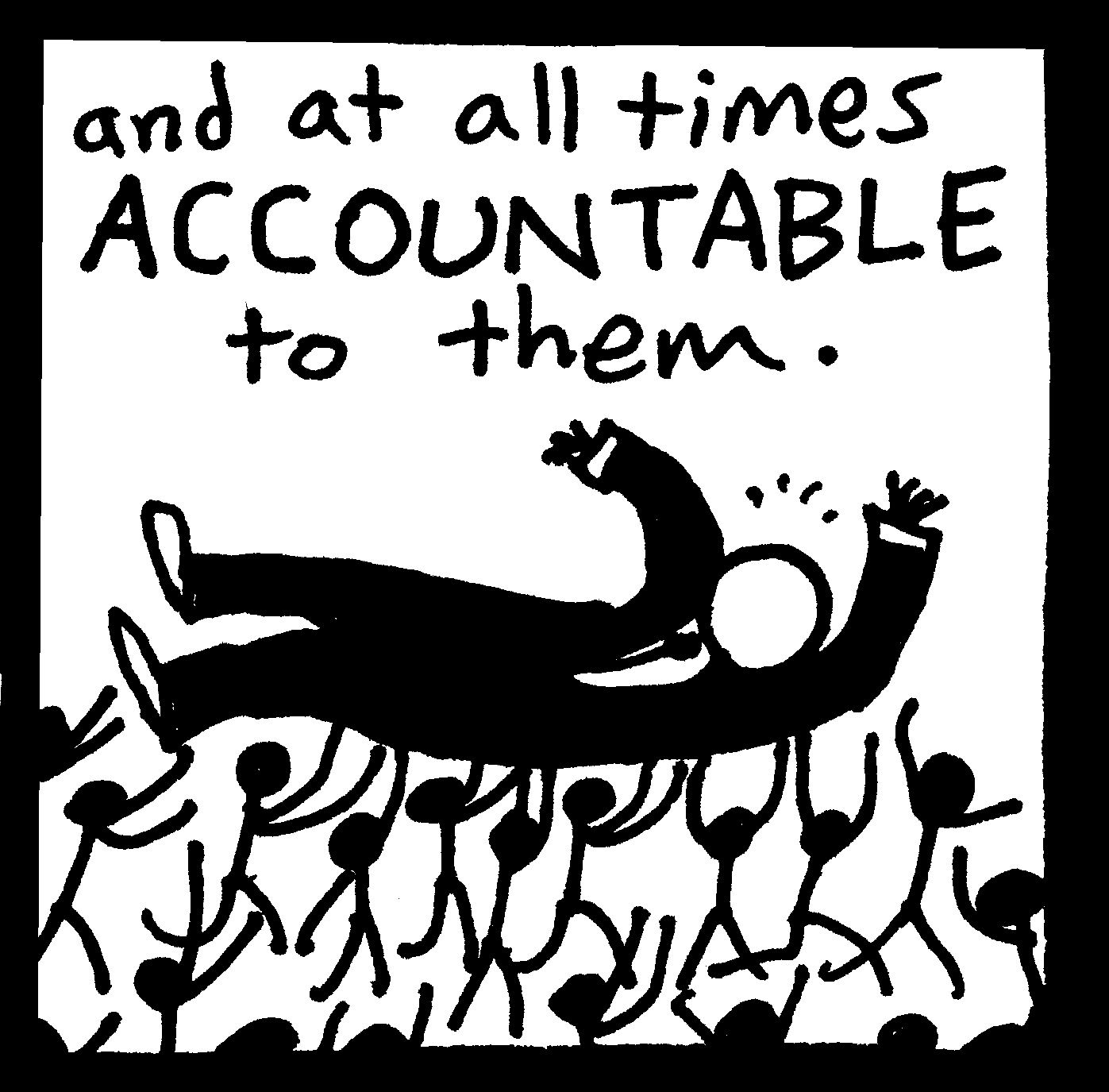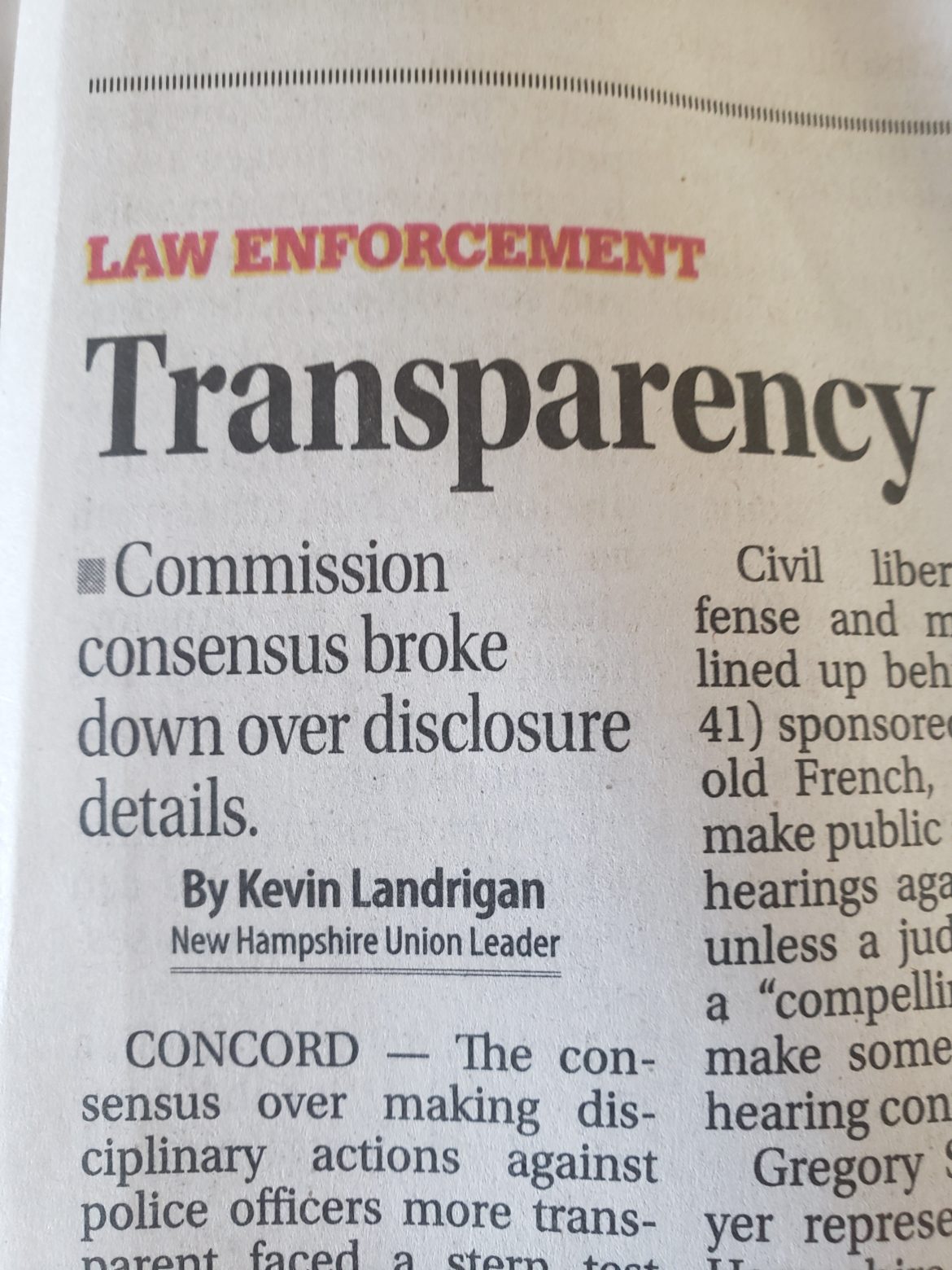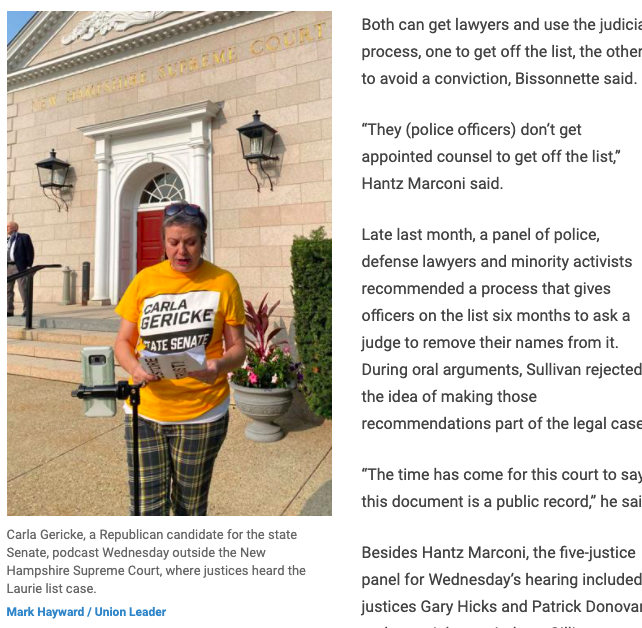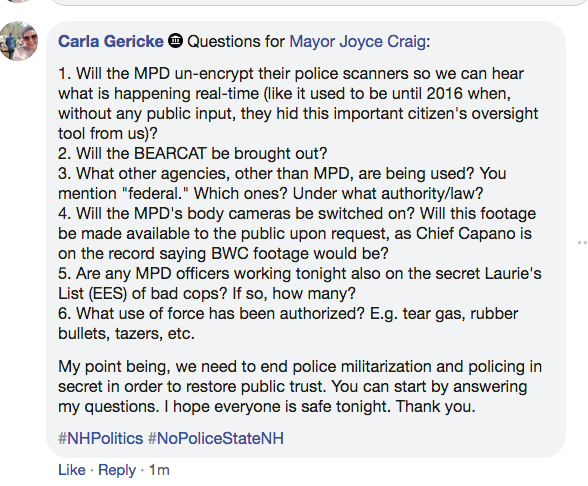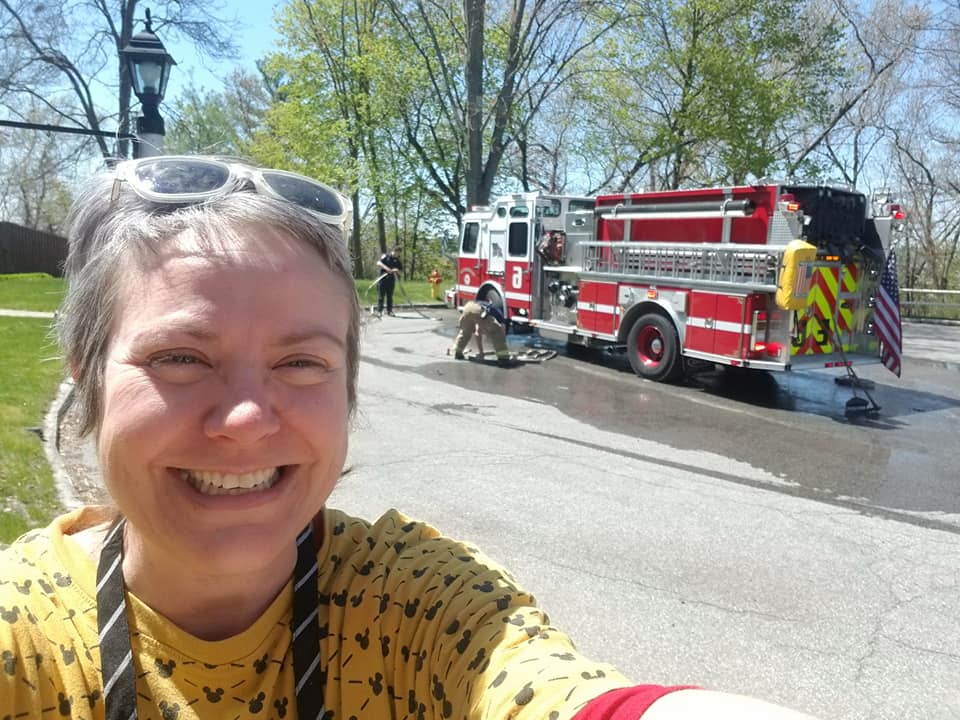This week, Tammy and I cover a lot of ground! We discuss the elections, police body cams, Qualified Immunity, how much state funerals cost, and more (and more about you know what!). This one might get banned so get it while it’s hot!
91-A
Copied below is my testimony submitted in support of HB481 to establish a RTK Ombudsman.
Dear Committee Members,
Please support HB481 to establish a Right-to-Know Ombudsman.
My name is Carla Gericke, former Republican state Senate candidate in District 20. I live in Manchester, NH, am an attorney, and serve on several nonprofit boards, including Right-to-Know NH (RTKNH), a nonpartisan, statewide citizens’ coalition that works to improve government transparency and accountability.
RTKNH supports this bill and will be submitting testimony in support, so I am testifying in my personal capacity as a citizen.
Sadly, despite strong language in the NH Constitution regarding a citizen’s right-to-know, New Hampshire ranks very poorly for open and transparent government.
In 2015, the Center for Public Integrity found in the category of “Public Access to Information,” New Hampshire earned a grade of F, and ranked 49th out of 50 states. In the category titled “In practice, citizens can resolve appeals to access to information requests within a reasonable time period and cost,” New Hampshire received a score of 0. [Report HERE].
Surely with the NH Constitution stating that the government should “at all times” “be open, accessible, accountable and responsive,” we can do better than zero?
Why is it that Granite Staters do not have access to public information in a reasonable time frame and/or at a reasonable cost?
(1) Because the burden on citizens to resolve Right-to-Know complaints is very high. When state departments, for whatever reason, deny a RTK request, citizens are forced to file a lawsuit in Superior Court. This is intimidating, expensive, and time consuming.
(2) Municipalities seem mis- or ill-informed and/or lack proper training about citizens’ Right-to-Know. They now regularly, as a matter of course, deny requests without any solid legal footing, forcing citizens into the courts. Some departments are even on record as saying filing Right-to-Know requests is regarded as a “hostile act.” This view is unacceptable.
In 2017, a task force was convened to try to rectify New Hampshire’s lack of open government. After months of meetings, stakeholders from different sides unanimously agreed that citizens need an easier, cheaper, faster grievance resolution process which reduces cost for all parties. As a result, establishing an independent Right-to-Know Ombudsman position was recommended. (Final report HERE.)
Initially, I was against this notion, thinking, “Here we go again, instead of fixing a problem, we’ll just end up growing government.” But in the past four years, as I have struggled with my own open record requests, been denied access to police body camera footage (did you know police body cam footage is secret in all but a few situations? Yeah, me either!?!), and watched high profile and expensive cases wend their way through to the NH Supreme Court, I have changed my mind.
We need a Right-to-Know Ombudsman ASAP. Even though there is some expense to hiring this position, which will be borne from the Secretary of State’s office, the savings from expensive lawsuits and attorney’s fees should easily counteract this. Also, sometimes we have to incur an expense to fix a problem, and with the courts overwhelmed, and slow, an Ombudsman seems like a reasonable compromise to increase government transparency, which in turn increases accountability.
Speaking of accountability, this legislative body has now had several years to pass this bill, and transparency is getting worse, not better. Please don’t make it almost thirty years, like with Fenniman, before we start to fix what is clearly a growing problem.
Let’s move in the right direction. Let’s establish a cheap, fast, easy, streamlined, credible, and impartial way for citizens’ to ensure our government is “open, accessible, accountable and responsive” to us.
This bill also includes a sunset clause, so on the off-chance we find the Ombudsman is not serving Granite Staters well, we can change course. Let’s give this a try in the meantime!
I ask that you support HB481. Thank you for your time.
Sincerely,
Carla Gericke
West Manchester
In Newspeak: “Transparent” Means “Secret” When It Comes to Police Accountability
Yesterday, several bills relating to police accountability and YOUR right-to-know what your government is up to were heard remotely via Zoom before the Senate Judiciary Committee, chaired by Sharon Carson of District 14, who is rated a C+ by the NHLA.
I sat in on on more than four hours of testimony on three bill, which I will break down for you below. Fair warning, don’t freak out at the summary headings. I pulled these from the bills themselves, and they are framed to improve the chances of a bill passing (know your audience–statists–as they say).
You can read RTKNH’s positions HERE, my submitted written testimony HERE, which I summarized in my oral remarks, while also trying to address some of the issues and questions the committee raised, while also trying to comply with the arbitrarily imposed “three minute” rule, which was not equally applied to state agents and the public.
Guess which side was consistently given more time? Hint: Public hearings about government transparency and openness where the public is marginalized at the expense of the state. Say it isn’t so!?! To be fair, I have attended other committee meetings that were even more egregious with their time allocations, so hopefully, if we continue with these kind of remote sessions, we can actually just apply the rule equally to all… with a timer. Easy-peasy!
SB40: This bill permits a warrantless search of a motor vehicle with the informed consent of the motor vehicle operator
Currently, LEOs will trick unsuspecting drivers into “consenting” to searches where they don’t have probable cause or a warrant, thus allowing them to go on fishing expeditions which often end up with an arrest for non-violent, recreational drug use that had NOTHING to do with the original traffic stop. This bill aims to rectify this subterfuge by compelling officers to “expressly inform the operator of the motor vehicle that:
(a) The operator has the right to refuse to consent to a search;
(b) Any refusal to consent to a search shall not constitute a basis either for probable cause to arrest the operator or reasonable suspicion to detain the operator;
(c) The operator cannot be charged with any crime or violation for refusing to consent to a search; and
(d) The operator cannot be further detained for refusing to consent to a search.
II. If the operator of a motor vehicle refuses to consent to a search, the law enforcement officer shall cease any further questioning concerning consent to a search.”
Introduced by Senator French (B rating from the NHLA, the best we can do in the Senate until you elect better candidates, ahem :P) and followed by testimony in support from the ACLU-NH, Rights & Democracy, defense attorney Penny Dean, law professor Buzz Scherr, State Representative Leah Cushman, and others. Everyone from the private sector spoke in support of this bill, many commenting on the fear and nervousness most people feel when they get pulled over.
Several law enforcement officers also testified (Joseph Ebert, Marc Beaudoin, David Goldstein), claiming to be “neutral” or “take no position,” but also making several suggestions to change the bill in various ways. One of proposals is to add the word “solely” in the sentence, “The operator cannot be [solely] further detained for refusing to consent to a search.”
Another suggestions was to create a standard form that must be signed before a roadside search without a warrant can take place. A concern raised in response is that non-English speakers are often advised by legal assistance organizations to not sign forms they cannot read, understand, and thus provide “informed consent” to, so it is possible that some people will be negatively impacted, whether through signing something they didn’t fully understand (probably an issue for a large portion of folks in such a frightening situation), or by refusing to sign the form.
My take: There seems to be an appetite to pass something, codifying what appears to be general practice already. Some towns in New Hampshire already have forms like this. Promoting informed consent is always a good idea, but we’ll have to see if that is really the result.
SB41: This bill provides that a party may petition to close a portion of a police disciplinary hearing
Again, don’t have a brain-melt at that summary. These proceedings are currently ALL SECRET, so this bill will actually improve transparency and accountability by setting the default to “open,” with the option to “close” some parts. The bill language: “Police Standards and Training Council; Powers. Amend RSA 106-L:5, III to read as follows:
III. For the purposes of a disciplinary hearing, subpoena and examine witnesses under oath, take oaths or affirmations, and reduce to writing testimony given at any hearing[. Any] provided that any person whose rights or privileges may be affected at such a disciplinary hearing may appear with witnesses and be represented by counsel, and further provided that any disciplinary hearing shall be public, but a party may petition to close a portion of the hearing to the public if the party seeking closure proves that such portion of the hearing would disclose confidential information and that the disclosure creates a compelling interest outweighing the public right of access.
2 Effective Date. This act shall take effect 60 days after its passage.”
Senator French introduced the bill. Afterwards, Senator Carson rightfully asked who gets to decide about “the compelling interest” that “outweighs” the public right to access. I agree there is a problem with the current wording, and that it should be clarified. Some suggested “the hearing officer,” “a neutral party,” and “the council.”
Several people brought up the especially egregious case of MPD racist cop, Aaron Brown, who was ordered under arbitration to be reinstated, and, after Chief Capano rightly refused, Manchester taxpayers got saddled with a $200,000 settlement payment. (<— And people wonder why there is no trust?!? LOL)
My take: This bill is long overdue and a crucial step to maaaaaaaaaybe restoring trust in law enforcement. The default should be for more openness and transparency. In order to close down any portion of the hearings under this bill, I’d like to suggest the determinations should be part of the Right-to-Know Ombudsman’s duties. The RTK Ombudsman bill (which is a bill that RTKNH has been championing for several years, since Sununu’s last “Let’s Pretend to Do Something Task Force”) is again up to be heard this year. Maybe tying some of these issues together will give the Ombudsman Bill a better chance of finally passing?
SB39: This bill exempts information and records contained in personnel files, internal investigations, and pre-employment background investigations of any state or local law enforcement officer from public access or disclosure under the right-to-know law
I can’t lie, I was deeply disappointed that Senator Carson would introduce what must be the most galling, in-your-face, fuck-you-guys, anti-liberty, anti-transparency bill that I have seen in a long time. Frankly, it’s shocking to me, given the current climate regarding much-needed police reform, and given the fact that it took twenty-seven years to overturn the wrongly decided Fenniman decision (during which time Granite Staters have purposely been kept in the dark about state agents’ malfeasance, compounding problems that will take years to reform) that Senator Carson would attempt to pass this bill, which did not have any co-sponsors.
This bill flies directly in the face of the police reform measures suggested by the LEACT Commission, which, go figure, was made up 50% of law enforcement, so you know those recommendations are already pretty watered down. During SB39’s hearing, LEOs gave confusing and contradictory testimony about whether this bill would actually support the LEACT Commission’s recommendations or not (it sounded to me like it did not but that they didn’t want to admit that, even when Senator Whitley asked in different ways several times).
In my oral testimony, I pointed out that police reforms is happening because we are now able to record police officers (in part due to my landmark 1st Amendment court case affirming the right to film police officers in the execution of their public duties). Video recordings mean there is finally PROOF of bad cops. Beforehand, LEOs would just lie, deny the truth, falsify reports, etc. and the courts and the Regime would play along, nothing to see here, until you start to SEE it. Seriously, do yourself a (dis)favor… spend an hour on Youtube clicking through police brutality videos. You may come away with the right impression that there is an “epidemic of isolated incidences.”
I tried to address some of the red herrings proffered by Carson, including:
1. Not hiding police personnel records would result in a “chilling effect” on hiring and retaining officers. How about this: If you’re concerned about that, maybe don’t become a police officer in 2021. We want honest, good cops, thanks.
2. Concerns about “doxxing” or exposing private information like “blood types,” “home addresses,” and “medical records.” This is an absurd example, and can easily be dealt with through redactions of the portions of private information not needed to be shared publicly.
3. Officers will get swept up in “unfounded or unfair” accusations… Well, let’s see, your jobs are literally to investigate shit, so either you are competent at your job and we can dispel with this concern, or you are incompetent at your job, in which case more transparency is 100% warranted.
I also pointed out that as written, this bill violates several provisions of the NH Constitution (including Article 10, by creating a special “class of men,” and Article 8, our Right-to-Know) and that it would not stand up to legal scrutiny. I ended with an impassioned plea to not push New Hampshire back thirty years again by returning to darkness. Instead, let’s choose sunlight, openness, and love.
ACTIVIST ALERT! We need to KILL THIS BILL. Based on the testimony in support of this bill, all from state agents, they’re taking the “oh-so-reasonable approach” of, “well, of course we need to address your concerns, and carve out a few exceptions for you,” and “oh, we should totally make this apply to all government agents and municipalities, not just police” but that is THE EXACT OPPOSITE of what needs to happen. This bill MUST die if transparency is to live.
I will post some suggestions about what we can do, but it starts with informing the public that the NH Senate is trying to reverse progress on police reforms by writing a law to hide ONLY law enforcement personnel records, internal investigations (you know, literally, their disciplinary stuff) and pre-employment info (where it might tell you a cop got fired from his previous gig). So, tell people you know, track the bill, sign up to testify at future hearings, write your senators now to demand they kill this bill, write local Letters-to-the-Editor, call radio shows, etc. Together, Granite Staters from all walks can say, NO! This is NOT good enough!
Other News Coverage
Union Leader: “Secrecy with respect to law enforcement decisions and agencies is no longer acceptable,” Sullivan said. More…
NHPR: “At a state Senate Judiciary Committee hearing Tuesday, members of the public testified on Senate Bill 39, which would bar public access to police officers’ personnel files.
Senate Bill 39 would directly exempt any information in an officer’s personnel file from becoming public under the New Hampshire right-to-know law, which allows citizens to request and receive government documents. Currently, police personnel files can only be disclosed if there is a compelling public interest, a determination that can only be made by a judge.” More…
InDepth NH: “But opponents of the bill, which outnumbered supporters two-to-one, said it would harm the state’s push for greater transparency and accountability for law enforcement after George Floyd was killed last year by a police officer in Minnesota.
“This would be a perfect avenue for bad cops to be protected,” said Ronelle Tshiela, founder of Black Lives Matter Manchester and a member of the governor’s Commission on Law Enforcement Accountability, Community and Transparency. “This bill is an enemy to both accountability and transparency.”
The bill could negate a recent state Supreme Court decision that the Laurie List for police officers with a history of dishonesty, excessive force or instability is a public document.” More…
I staged a protest of one at today’s Supreme Court hearing about the Laurie’s List, a secret list of bad cops protected by the AG’s office at the expense of the taxpayer.
“Shining the light of public scrutiny on law enforcement only improves the quality of law enforcement over time,” Sullivan said after the hearing.” Gregory Sullivan, Lead Attorney for the Union Leader.
Read Mark Hayward’s coverage of the court case HERE.
Questions for Mayor about Militarized Policing and Unnamed Federal Agents Operating in Manchester
Yesterday, Mayor Joyce Craig posted this:
I stand with all those who are peacefully protesting the unjust killing of George Floyd, and the racism and violence directed at Black Americans across our country. We know we must do better, and I remain committed to listening to and supporting our community during this time of mourning and outrage.
Peaceful protest to bring attention to systemic racism is right, but causing destruction to our communities is not.
The Manchester Police Department has heard of potential threats to our City and are taking them extremely seriously. Our Emergency Operations Center will be open and operating this evening, and while we are hoping for a peaceful night in Manchester, the City is prepared for any scenario. We are working with our state and federal partners to ensure the safety of our City, and I am thankful to all of our first responders for all that they have done to keep Manchester safe and treat the people of our community with respect and compassion.
In response, I posted the following questions for Mayor Joyce Craig:
1. Will the MPD un-encrypt their police scanners so we can hear what is happening real-time (like it used to be until 2016 when, without any public input, they hid this important citizen’s oversight tool from us)?
2. Will the BEARCAT be brought out?
3. What other agencies, other than MPD, are being used? You mention “federal.” Which ones? Under what authority/law?
4. Will the MPD’s body cameras be switched on? Will this footage be made available to the public upon request, as Chief Capano is on the record saying BWC footage would be?
5. Are any MPD officers working tonight also on the secret Laurie’s List (EES) of bad cops? If so, how many?
6. What use of force has been authorized? E.g. tear gas, rubber bullets, tazers, etc.
7. How much is this costing the taxpayers? Where is it accounted for (line item/budget)?
My point being, we need to end police militarization and policing in secret in order to restore public trust. You can start by answering my questions. I hope everyone is safe tonight. Thank you. #NHPolitics #NoPoliceStateNH
And followed up this morning with these additional comments:
If you are genuine in your desire to fix problems in Manchester, you need to address these questions. The MPD has been getting away with too much in the dark for too long…
Did you know body cam footage is apparently NOT subject to Right-to-Know… why would this be the case other than to hide things?
Why are the police scanners encrypted? Do the militarized police see ordinary citizens as the enemy?
Remember this case? Look at the shocking lack of oversight we can expect from the AG’s office… the same individuals who are keeping a list of bad cops secret from the public even after a judge ruled in April last year that it should be disclosed because it is in the public interest to know who officers with “sustained findings of misconduct” are…
I wonder if any MPD officers are on that list? Or, are any of these officers still employed in NH?
“Nonessential” Neighbors Battle and Extinguish Dangerous Brush Fire in Densely Populated Manchester Neighborhood Before “Essential Responders” Show Up
If that headline sounds melodramatic, it’s simply mimicking press releases from the media in similar situations, except I’ve used the government’s new designations regarding who they think are “essential” and “nonessential.” I think we proved we’re essential to ourselves, no matter what anyone who claims they’re more “essential” says.
Yesterday, my husband, one of my neighbors, and I battled and extinguished a dangerous in-town brush fire. Below is my first-person account of the events (as posted to Facebook within the hour), as well as my Right-to-Know/91-A Request filed with the Manchester Police Department today to get copies of the body camera footage that was recorded by some of the officers at the scene.
I am very grateful we were able to take care of the immediate danger before anyone got hurt or any real property was destroyed. I hope the City makes a better effort to clear-out Gossler Park’s brush. A few years ago, kids were regularly setting small fires back there, but this was the first one I’ve seen in years. Glad it worked out!
***
From our kitchen, I spot Louis running past the living room windows towards our garage. I open the door and stick out my head, “Where you running to?” He’s already grabbing a couple of shovels. “There’s a fire at Brinck’s house!”
The minute he says it, I smell it.
Fuck.
“OK, I’ll grab our extinguishers and meet you there.” I race around the house, collecting extinguishers from my kitchen and basement, and an extra one I keep stashed. I’m in house PJs and an apron, but I grab my belt and click on my gun. I have no idea what’s waiting out there. Proper preparation, what what.
The fire is burning behind Brinck’s house, on the school’s property, a couple of feet from the wooden fence, which, since it’s old and dry, would light up like a matchbox. The brush is burning maybe a couple of feet, one foot, from the fence. It is TINDER back there, with overgrown brush, fallen trees, piles and piles of leaves. Two tween boys are throwing sand on the burning leaves. One yells, “We didn’t do it! We just saw the smoke.”
Louis is tossing sand on the flames with his shovel. Matt is using the sprinkler hose over the fence to try to dose some of the spreading flames. I pull the pin on one of the extinguishers and start spraying the base of the flames. (I was trained as a fire fighter in high school.) The smoke and white stuff blinds me, but I keep going. After a while, the kid grabs the extinguisher, and, as I am alarmed at how much the fire is now spreading, and how little defenses we have, I run back to our garage to grab two 5 gallon spring mountain water jugs and run back (I definitely got my workout today).
The fire is dead in several zones, but rekindling is several others. One particular pile of dead trees looks like a natural pyre, and so I use the other extinguisher on that.
Somewhere on one of my runs between the houses, an unmarked police car shows up. The officer in jeans and a black shirt with his badge on a thick chain around his neck starts walking onto Brinck’s property through the back gate.
“Excuse me, I don’t think you should do that. I don’t think the property owner would consent to that.” At this stage, I do not know that Brinck is actually at Whole Foods. “The fire isn’t on the property, it’s behind, on the school’s side.” He keeps walking down, almost behind the building. Loudly, I say, “Hey! You’d need to ask him first.” He comes back to the street.
“Why… does he have a gun?” I don’t respond. I am clearly opening carrying, so I just shrug. “Look, I don’t have time, I’ll ask him to come out.”
We fight the fire. A uniformed cop comes out back, and helps. The fire truck shows up just as the fire turns and is heading back down the hill, away from our properties. 3 more squad cars show up. The fire fighters head out back, pulling their hose past the pool area, but the police just mill around on the cul de sac.
The fire near Brinck’s fence is dead, the rest is under control, heading down the hill, where, I believe another fire truck is stationed. An officer starts asking me questions. I tell him I live next door. We chit chat a bit, then after I swear while recounting the situation, he says, “Oh, I need to let you know I’m wearing a body cam.”
“Yeah, you are,” I say with the cheekiest of grins. He looks confused. “That’s because of me,” I explain and stick out my hand. He’s wearing a mask. “I’m Carla Gericke.” He doesn’t take my hand but we half-heartedly elbow bump.
I ask the firefighters if there’s a way to get my personal extinguishers replaced, “You know, now that we’re just giving away free shit wily-nilly.” He is not amused, but says, “We don’t do that.”
When I head home, 4 officers are standing around near their cars on the street in front of my house. I walked over to say hi, introduce myself, and say, “It’s all under control now, we put out the fire, y’all can scoot on out of here.” The senior-seeming guy doesn’t really know what to do with that. The firemen unleash the fire hydrant at the end of the street and the road starts flooding with water. At least we now know it works! “It’s going to get wet here,” the officer says. “Yeah,” I say, “I’m heading home. Bye now!”
What can I say? Everyone was professional. They seemed amazed that we knew what to do and took care of it ourselves. When one started fronting about showing up to save us, I gave him a look, and he said, “Yeah, okay, you guys really took care of it before we got here.”
And that we did. Essentially.
I can still taste the soot, and I smell like a chimney, but all is well that ends well. Now, let’s end this bullshit lockdown, and let liberty rise! ![]()
![]()
***
Dear Manchester Police Department,
RE: Right to Know Request per RSA-91A
Pursuant to the Right to Know Law (RSA. 91-A), I am requesting public access or emailed electronic files of, within 5 business days, the governmental records reasonably described as follows:
All Manchester PD body cam footage from police officers as captured on May 14th, 2020 between approximately 13:30-15:00 at a brush fire event on Gossler School property, which was accesses from Durette Court, Manchester.
The following emergency vehicles were parked on Durette Court during that time: one black unmarked vehicle with two un-uniformed police officers (male and female), and three SUV cruisers. One firetruck was present.
I’m only seeking footage involving interactions between police officers and civilians during that time frame.
If you deny any portion of this request, please cite the specific exemption used to justify the denial to make each record, or part thereof, available for inspection.
Please let me know when these records are available for inspection or, preferably, you may email the records to: carlagericke@gmail.com. I will also submit this request via email directly.
Thank you for your lawful attention to this matter.
Sincerely,
Carla Gericke
[Phone number and email redacted]
Per RSA 91-A, governmental records means “any information created, accepted, or obtained by, or on behalf of, any public body, or a quorum or majority thereof, or any public agency in furtherance of its official function. Without limiting the foregoing, the term “governmental records” includes any written communication or other information, whether in paper, electronic, or other physical form, received by a quorum or majority of a public body in furtherance of its official function, whether at a meeting or outside a meeting of the body. The term “governmental records” shall also include the term “public records.”
One of my key issues is government transparency because without access to information, we have no way to hold our government employees accountable. Without transparency, there is no accountability, and without accountability, taxpayers are… screwed.
The NH Constitution, uniquely among most states, has an article specifically on its citizens’ Right to Know. It states:
Art. 8. Accountability of Magistrates and Officers; Public’s Right to Know. All power residing originally in, and being derived from, the people, all the magistrates and officers of government are their substitutes and agents, and at all times accountable to them. Government, therefore, should be open, accessible, accountable and responsive. To that end, the public’s right of access to governmental proceedings and records shall not be unreasonably restricted.
Open. Accessible. Accountable. And responsive. AT ALL TIMES.
This is what I stand for!
For too long, New Hampshire has been moving away from these key protections. The AG’s office now expends meaningful resources on redacting information–imagine if we used those resources to be open, accessible, accountable and responsive instead!
This week alone, the Union Leader has featured several articles outlining situations where local officials are saying we don’t have a "Right to Know."
There’s this one, about the Laurie List, which names 171 police officers who have been found to have credibility issues such as: using excessive force, lying under testimony, committing sexual harassment, and falsifying reports.
Mind you, we’re not even talking about disciplining these people… we are simply asking to KNOW WHO IS ON THE LIST. Instead of providing the information to the Union Leader and the NH-ACLU in response to their RTK filings, the AG’s office sent a response with all the names blacked out. Is this what we want in the Granite State?
To make matters worse, Senior Assistant Attorney General Francis Fredericks said: "Disclosure would amount to an invasion of the officers’ privacy." Unacceptable! The ACLU said this position creates special treatment for police officers:
“The public has a right to know whether officers serving them have engaged in conduct that impacts their credibility or truthfulness. As the New Hampshire Supreme Court has repeatedly explained, the public interest in disclosure is great when it will expose potential government misconduct."
In this one, a local police department refused to let a reporter inspect documents for free, instead insisting he pay copying fees to see the files. At a dollar a pop/page in some jurisdictions, this is cost prohibitive for many Granite Staters, and is designed to have a chilling effect. It is designed to stop you (and the press) from getting the information you seek. Again, unacceptable!
I serve as a board member at Right to Know NH. I talk the talk, AND I walk the walk. This volunteer organization worked on several good bills that were introduced this past legislative session, including an Ombudsman Bill that makes it easier for you to get access to information.
As your Senator, I will push through these kinds of protections. I will also work to rollback the troubling trend towards hiding behind illegitimate excuses. And I will always work to ensure your government remains open, accessible, accountable, and responsive to YOU.
Please support me next Tuesday, September 11th in the Republican primary. I ask for your vote on November 6th.

